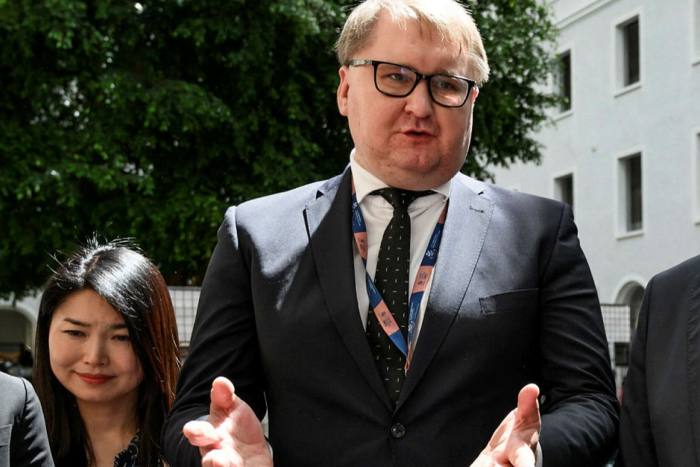[ad_1]
A deal to end Russia’s blockade of Ukrainian seaports and grain exports remains distant because Moscow is using talks to push its war aims and ambition to dominate the Black Sea, Kyiv’s top negotiator said.
Turkey and the UN are trying to broker an end to Russia’s naval blockade in the Black Sea, which has crippled Ukrainian commodity exports and triggered fears of global food shortages.
But Taras Kachka, Ukraine’s deputy minister for the economy and lead trade negotiator, said Russia’s efforts to conquer the country’s south were preventing a deal and rumours of a breakthrough were “more optimistic than reality”.
“If there are talks, we will participate. But that doesn’t mean we will agree to any option that is on the table,” Kachka said. “Any attempts to base a food security solution on the goodwill or grace of Russia will not work or be trusted.”
Kachka’s comments came days after G7 leaders implored Vladimir Putin to lift the Black Sea blockade ahead of Ukraine’s imminent summer harvest, with fears that the country’s grain storage capacity could be quickly exhausted unless space is cleared. Ukraine accounts for about 13 per cent of global grain exports.

Kachka said the blockade was part of Russia’s plan to dominate the Black Sea and exert power over global commodity markets, as it had done in Europe using its natural gas exports.
“Grain as a commodity is better than gas because the demand is not flexible. For gas, you can just switch to coal. Everyone needs bread,” he added.
Among Russia’s conditions to end the siege is that it be allowed to inspect vessels entering and exiting Ukrainian ports. Kachka likened the idea to piracy.
“What does it mean, that Russia has the right to inspect? Is it a right to veto [ships]? Or is it just some kind of additional payments to corrupt Russian military officers . . . like to Somali pirates?” he said.
Other “technical solutions”, including what he said was a Turkish proposal to co-ordinate shipments, did not deal with the underlying insecurity caused by the war, Kachka added.
Russian missiles struck Odesa, Ukraine’s biggest port, on Monday, part of a wave of aerial attacks across the country. Ukraine has also attacked Russian-occupied Black Sea natural gas platforms and Snake Island, which lie close to shipping lanes.
On Thursday, Russia said it was withdrawing its forces from Snake Island in a “gesture of goodwill” that could bring a deal to unblock the ports closer. Ukrainian officials claimed victory, saying Russian forces had been forced to surrender the island under heavy bombardment.
Russia has said that if Ukraine removes mines placed in its waters following the invasion it will allow vessels out of the ports. But Kachka said Ukraine could not disable its coastal defences as long as Russia remained in a position to invade again in the south.
“They are trying to use [the talks] as a way of legitimising their military presence there. This is impossible for us as well.”
Kachka said Ukraine would accept a third country’s naval presence to escort vessels, including “Her Majesty’s fleet or the US or Turkey”. But western countries are opposed to direct confrontation with Russia, despite their financial and weapons support for Ukraine.
Russian smugglers have already been exporting grain looted from Ukrainian territory in recent weeks.
Ukraine has stepped up some overland exports of goods and is sailing barges through a section of the Danube and on to Romania’s Black Sea port of Constanța. But shipment volumes are a fraction of prewar totals.
“Russia is strangling Ukraine by blockading its ports. There is no substitute to the Black Sea ports in delivering 50mn tonnes of soft commodities to global markets,” said Andy Hunder, president of the American Chamber of Commerce in Ukraine.
Even if a deal to allow escorted vessels through waters could be agreed, commercial shippers would be wary about sailing through waters controlled by Russia’s military, Hunder added.
“Russian missiles and military ships are a risk too big to bear for commercial vessels and insurance companies.”
[ad_2]
Source link

